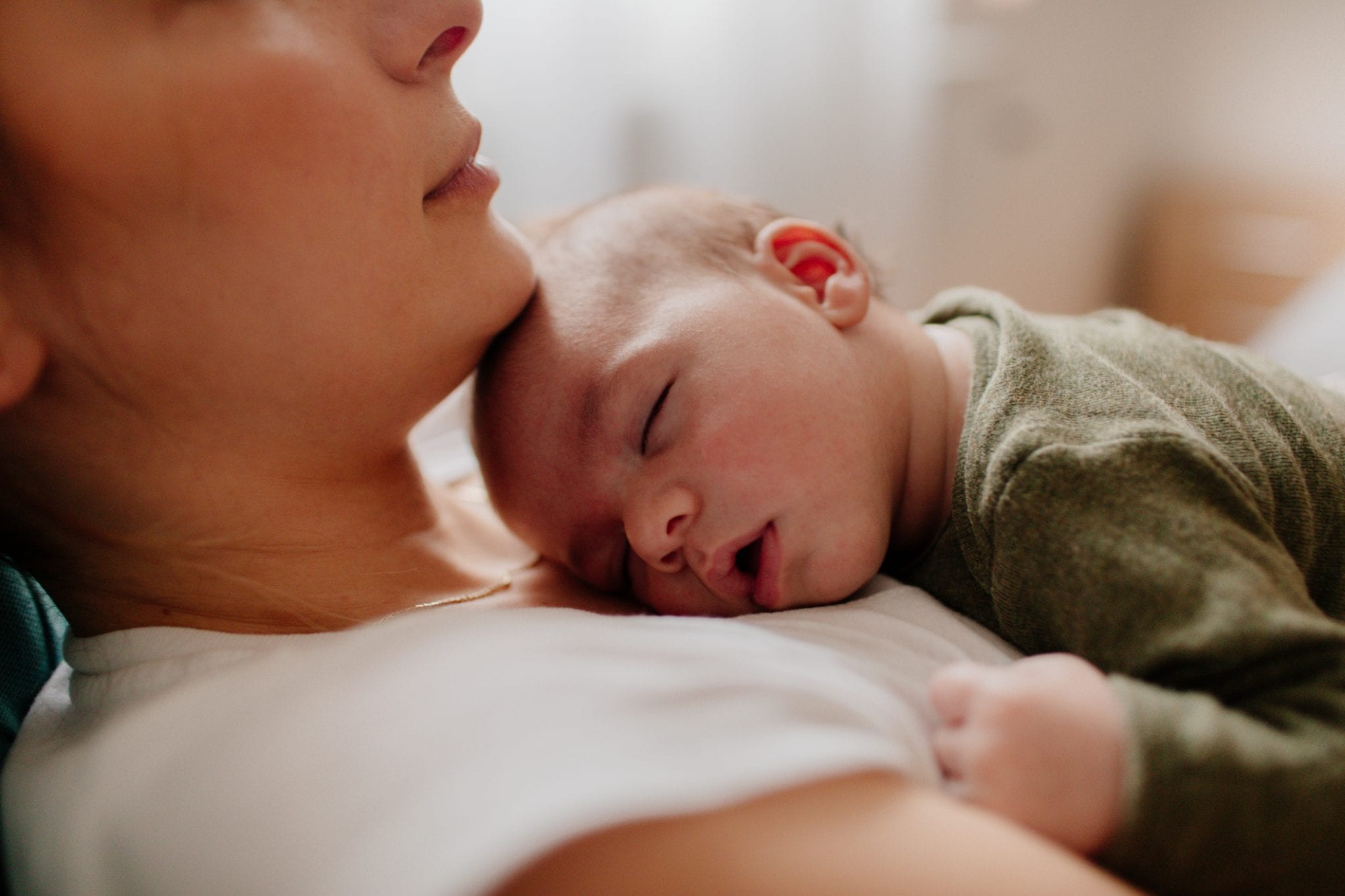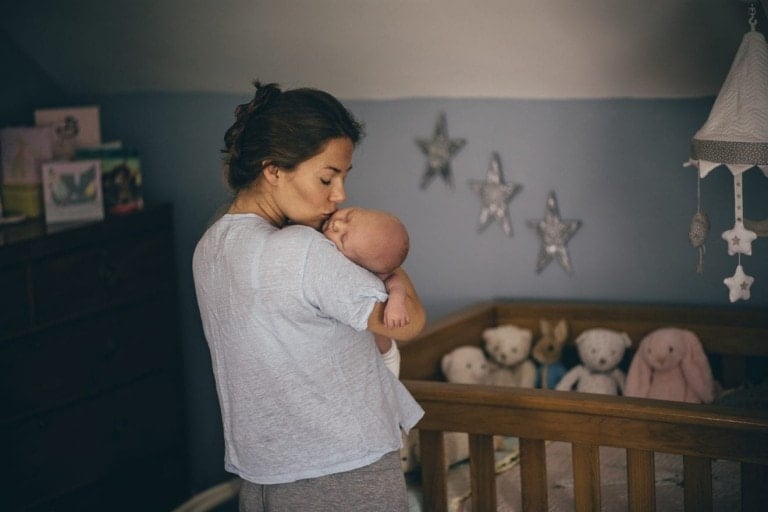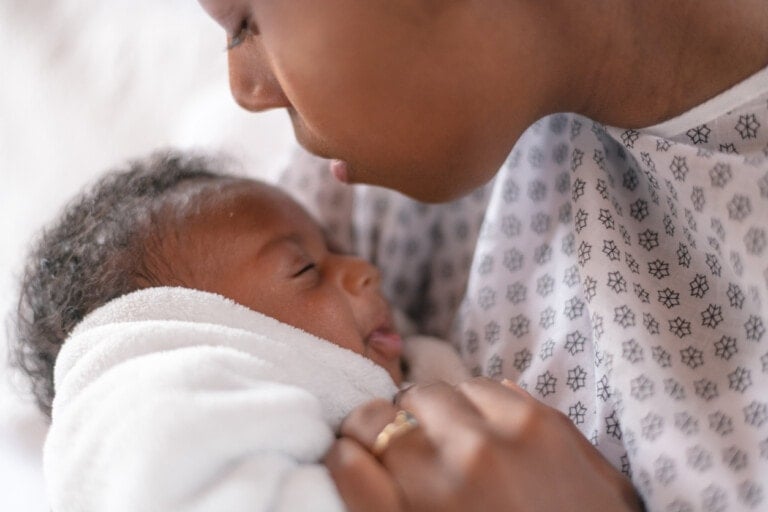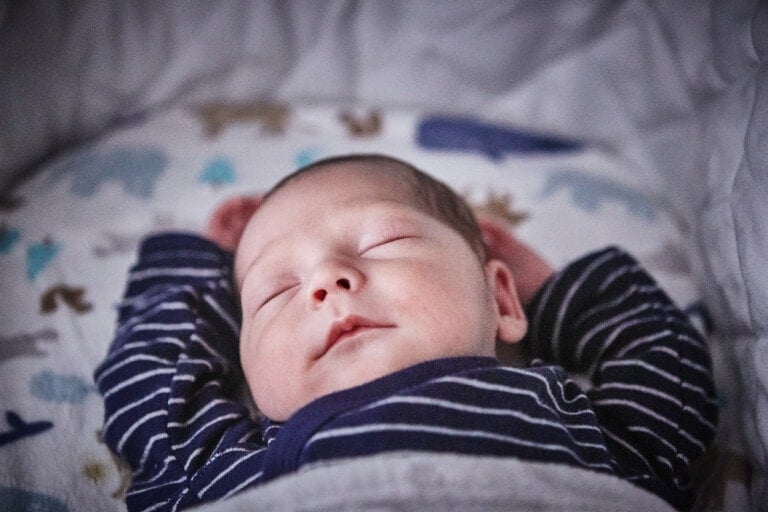Gazing on a peacefully sleeping child can melt your heart, and the term “sleeping like a baby” conjures up sweet images in many people’s minds. But for new parents, accomplishing the sight of a serenely sleeping infant amidst showerless days, countless diapers and a lack of sleep can be challenging. It’s well-known that newborns and babies need a lot of sleep for optimal growth and development, but new parents may struggle to establish sleep training and a baby sleep schedule that works for their family.5 This article discusses newborn and infant sleep recommendations while answering common questions about sleep schedules during your child’s first year.
How Much Do Newborns Sleep?
According to the American Academy of Pediatrics (AAP), newborns do not have regular sleep cycles for up to six months. Although you can expect a newborn to sleep as much as 16 to 17 hours a day, those hours are several frequent one- to two-hour naps.1
Newborn sleep cycles differ in duration, amount, and timing from older children and adults. A newborn’s sleep patterns can initially seem random, with your baby waking and sleeping around the clock. Conversely, uninterrupted sleeping for more than four to five hours can harm a newborn’s health and is not recommended.1,5
Newborns up to about 3 to 4 months have different sleep schedules because they are hard-wired that way. Frequent awake times allow babies to maintain adequate oxygen levels and regulate their breathing.1,2,5 These frequent wakings are essential for optimizing breastfeeding, breastmilk production, nutrition, and growth. Irregular newborn sleep patterns contribute to parental sleep deprivation, and many new parents want to establish routines early. Just realize that as your baby grows and develops over the next few months, so will their ability to sleep in longer stretches. Understanding how your baby sleeps will help you make healthy and informed sleep choices.1,2,5
How Much Sleep Do Babies Need?
According to the American Academy of Sleep Medicine, babies aged 4 to 12 months should sleep 12 to 16 hours daily, including naps.4 Parents should work with, rather than against, their child’s developmental stages when prioritizing healthy baby sleep schedules.1,3,4
Parents interested in sleep training can begin at about four to six months if their baby is growing and feeding well. Make sure to get the okay from your pediatrician before starting. Initiating sleep training may not be reasonable until about six months when a baby’s circadian rhythm is more developed. Circadian rhythm is the body’s natural tendency to sleep at night and be awake during daytime hours. On average, most babies are not neurologically developed enough to be “taught” to sleep before four months, but some of this depends on the child and your situation.2,3,6,16,17
There are several approaches to sleep training, and while not necessary, studies show it can improve a baby’s sleep schedule and enable parents to get more quality sleep.5,9,10
The benefits of healthy sleep are well-known in children and include improved:4,7,8
- Attention
- Memory
- Behavior/mood
- Learning
- Emotional regulation
- Overall physical and mental health
Should I Wake My Baby To Feed?
The answer may depend on your baby’s age, their developmental stage, and whether they had any previous or current medical concerns. Generally, breastfed babies need to nurse eight to 12 times a day in the first month, while formula-fed infants will take about eight bottles daily. Feedings could be anywhere between two to three hours apart. Frequent feedings ensure adequate weight gain in newborns. With this in mind, you should wake your baby for feedings. As infants get older, from three to six months, talk to your healthcare provider about recommendations. Still, according to the AAP, healthy growing babies do not intentionally need to wake to feed.1
A baby who goes home after a neonatal intensive care unit (NICU) admission may have strict rules on the maximum time between feedings. Babies with special health care needs may have different feeding regimens, and you should consult your physician.11,12
When Do Babies Start Sleeping Through the Night?
Six hours of uninterrupted sleep is considered “sleeping through the night” for a baby.13 According to one study, 28%-57% of infants did not regularly sleep through the night.13 The conclusions do not necessarily mean infants continued to wake up every one to four hours, as you may expect from a newborn, but still, they did not sleep as long as parents may hope by one year.
However, some babies may sleep six hours at night by 3 to 4 months old. If your baby is growing, otherwise healthy, and still taking naps, this is not typically a cause for concern. Every baby is different, and several factors may affect how parents can reach the goal of sleeping through the night and when.1,14,15
Helping Your Baby Fall Asleep
First, babies need a safe place to sleep, and not all products are created equally. Ensure that any sleeping equipment you use, including reused cribs, meets safety standards. The AAP has fervently recommended that babies sleep on their backs. You may know of the “Back is Best” campaign established to reduce the risk of sudden infant death syndrome (SIDS).1,15
- Helping your baby fall asleep depends on their age and developmental stage. Your approach to sleep time with a 2-week-old versus an 8-month-old will look quite different.
- However, some strategies to promote a healthy baby sleep schedule include the following:1,14,16
- Respond to your baby’s sleep cues. Try putting them to bed when they are drowsy instead of already asleep.
- Talk in a quiet, soothing voice and keep the lights low.
- Try swaddling if it’s developmentally appropriate.
- Read to your baby before bedtime.
- Give your baby a gentle, relaxing bath and massage before bedtime.
- You may want your baby to sleep in the same room as you.
- Encourage awake periods and tummy time during the day.
Sleep Training
Sleep training involves slowly guiding your child into successfully self-soothing behaviors, promoting their ability to fall asleep independently at bedtime. If you plan to try sleep training, you may need to experiment with what works for your family. Some commonly known methods include:6,9,17
- The cry-it-out method (CIO)
- The Ferber method, a graduated variation of the CIO method
- Bedtime fading, which involves gradually adjusting bedtime
Sleep is a vast and interesting topic, and there are several great resources available online aimed at helping parents establish positive, healthy newborn sleep schedules and routines for their children. Many parts of parenting are trial and error; what worked like a charm for one baby may do nothing for the next. Children are always keeping you on your toes, and getting a good night’s sleep ensures you are both ready for the next busy day.
































